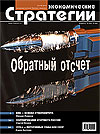Countdown
Opening address of editor-in-chief.

Opening address of editor-in-chief.
“The status of a major military power is the basis of our sovereignty. And this status includes not only the real military potential, but also accumulated reputation” — said a prominent political scientist, presidium chairman of the Expert council under the chairman of the Military-Industrial Commission of the Russian Federation, president of the National Strategy Institute Mikhail V. Remizov in his interview with Alexander Ageev. According to him, due to the Crimean events, the Russian army is perceived today as a highly professional even by malevolent persons.
Military use of pilotless vehicle (PV) — is it the only way to return the invested money, time and talents? Is it really so necessary for us to see civil drones in the skies of Russia? If yes, what should we do for the development of civil PV market in Russia in the nearest future?
How the Russian power engineering will behave under international sanctions conditions? How to execute introduction of new technologies, introduce new energy capacities and at that intelligently generate tariffs and not to rob the own people? What awaits Russia and its energy industry in the future? These and many other questions are examined by scientific director of the Institute of energy economics and housingcommunal complex, deputy Minister of Energy of Russia (1996 – 2003), former Board of Directors Chairman of RAO “UES of Russia” Victor Kudriavy in the interview with “Economic Strategies”.
In modern conditions criticism of “raw bias” of the Russian economy is growing from the part of representatives of a number of “scienceintensive industries” the image of which is formed primarily by Russian defence-industrial complex, and the main customer is the Ministry of Defence. From the viewpoint of the author, the problem seems quite different. Large-scale production of oil, gas, ferrous, non-ferrous, rare metals and other types of mineral resources can be more knowledgebased, efficient and effective. Public and private investment (including foreign) in subsoil development will make Russia’s economy stronger and richer.
The results of opinion poll conducted among participants of the Second closed business dinner for personnel directors of different enterprises and business owners, held in Moscow on October 11, 2013 in the “Davos” hall of “Swissotel Red Hills” Hotel, eloquently demonstrate that personnel problems in enterprises and companies from completely different branches of the Russian economy are very similar and require systematic approach and solution on a national or industry scale, and not within a single enterprise.
Within the framework of solving complex interstate problems the traditional diplomatic actions and military operations today are being replaced by indirect actions technologies that undermine rival state from inside. In the political and political science literature such actions and based on them policies are called “soft power”, which is discussed in the article.
National Security Concept of the Russian Federation cannot be considered as stiffened untouchable dogma. The concept’s sense and effectiveness are defined by its adequacy to modern realities, and they are subject to change. Therefore, the concept’s content should combine, on the one hand — firmness, stability of its fundamental principles and on the other — a timely response to emerging objective realities that require updating of various conceptual provisions. The current document in force has been already subjected to editing in 2000. However, a lot has changed since then, so we need a new edition, but not only introduction to the concept of a number of new provisions is required, but also the conceptual revision, that will cause introduction of fundamental changes in a number of other documents determining the state policy in different spheres of society. The article discusses some conceptual issues.
Many different opinions on the prospects of the Russian economy were expressed by the last economic year results: from restrained-optimistic to very pessimistic ones. At the Davos forum our representatives (from government and big business) as usual (learned) in a businesslike tone not admitting objections were speaking for some reason to the whole world about the internal developments of the Russian Federation and the problems, which are not of interest to anyone but ourselves. It is practically impossible to draw up conclusions from these statements about how we will ensure sustainable development and what role we define for Russian economy in the world economic system. Nevertheless, let’s look at the situation from a viewpoint of non-economist.
The current global economic crisis witnesses the next technological revolution, meaning transition from economy of material benefits to the economy of intellectual wealth. Productive motor forces yield the palm to productive intellectual forces. Infrastructure undergoes significant changes, applying flat economy on a larger scale and replacing traditional clusters and industrial parks by global industrial centers, educational, financial and innovative supermarkets.